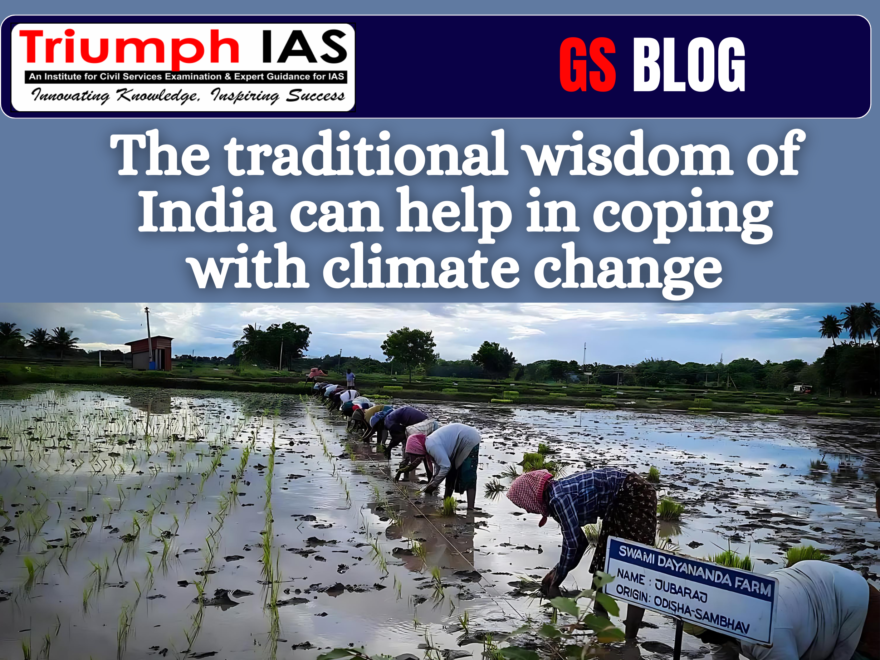The traditional wisdom of India can help in coping with climate change
In the summer of 2004, temperatures in coastal towns of southern France rose to a record 41 degrees Celsius, leading to the reported death of over 10,000 citizens, mostly elderly people. This stark contrast to the resilience displayed by communities in India and other parts of the world facing extreme heat and drought raises an important question – why do similar weather events cause such differential impacts in different geographical locations? The answer lies in the ways in which people have evolved to live with the nature around them. Traditional coping strategies, passed down through generations, have equipped some communities to better withstand the challenges posed by extreme weather. By exploring these local adaptations, we can gain valuable insights to inform preparedness for the impacts of climate change.
India, a country rich in cultural heritage, also faces a significant challenge – climate change. The country is particularly vulnerable to climate change due to its long coastline, dependence on agriculture, and extreme weather events. However, amidst this challenge lies a beacon of hope – India’s traditional wisdom.
For centuries, communities across India have developed unique ways to live in harmony with nature and adapt to changing environmental conditions. These traditional practices, often passed down through generations, offer valuable insights that can be incorporated into modern climate change solutions.
Traditional Practices for a Sustainable Future
Let’s explore some ways traditional wisdom can aid India in combating climate change:
-
Resilient Crops and Sustainable Agriculture:
Traditional Indian agriculture boasts a wide variety of crops that are well-suited to local conditions. These crops, often referred to as heirloom or indigenous varieties, are drought-resistant, pest-resistant, and require fewer external inputs. Studies show that reviving these crops can improve food security and reduce dependence on chemical fertilizers, mitigating climate change impacts.
-
Water Management and Conservation:
Water scarcity is a growing concern in India. Traditional water management techniques like rainwater harvesting, using canals for irrigation, and building community ponds can play a crucial role in water conservation. For instance, the ingenious stepwell system (baolis) prevalent in Rajasthan and Gujarat demonstrates how communities have traditionally ensured water availability in arid regions.
-
Living in Harmony with Nature:
Respect for nature is deeply ingrained in Indian culture. Traditional practices like worshipping trees, celebrating festivals that mark seasonal changes, and following sustainable fishing practices all promote a symbiotic relationship between humans and the environment. These practices can help foster a more mindful approach to resource consumption.
Examples of Traditional Wisdom in Action
Across India, communities are reviving traditional practices to adapt to climate change:
- In the arid regions of Rajasthan, farmers are returning to drought-resistant millet varieties like bajra and jowar. These crops require less water and thrive in harsh conditions, ensuring better yields even in low rainfall years.
- Coastal communities, frequently affected by cyclones and floods, are using mangroves for natural protection. Mangroves act as a buffer zone, reducing the impact of storm surges and floods. Traditional knowledge about the importance of mangroves is being used to conserve these vital ecosystems.
- In the floodplains of Assam, communities have for generations built houses on stilts. This practice safeguards life and property during floods, a common occurrence in the region.
Limitations and the Need for Modern Collaboration
While traditional wisdom offers valuable solutions, it’s important to acknowledge its limitations in the face of the unprecedented scale of climate change. Extreme weather events are becoming more frequent and intense, requiring a multi-pronged approach. Traditional practices can be most effective when combined with modern scientific advancements.
For instance, breeding traditional crops with modern varieties can create even more resilient strains. Similarly, using data analysis to predict weather patterns can complement traditional methods of water management.
The key lies in collaboration. Scientists, policymakers, and local communities need to work together to create solutions that leverage the strengths of both traditional wisdom and modern science.
Conclusion
India’s traditional knowledge offers a treasure trove of solutions for adapting to climate change. By reviving these practices, fostering a connection with nature, and collaborating with modern science, India can build a more sustainable future.
It’s important to note that some argue that traditional methods alone may not be enough. Large-scale changes and global cooperation are also necessary to address climate change effectively.
Overall, India’s traditional wisdom provides a strong foundation for building resilience in the face of climate change. By embracing this knowledge and fostering collaboration, India can move towards a more sustainable future.
Sociology Optional Program for
UPSC CSE 2025 & 2026
Follow us :



2 comments